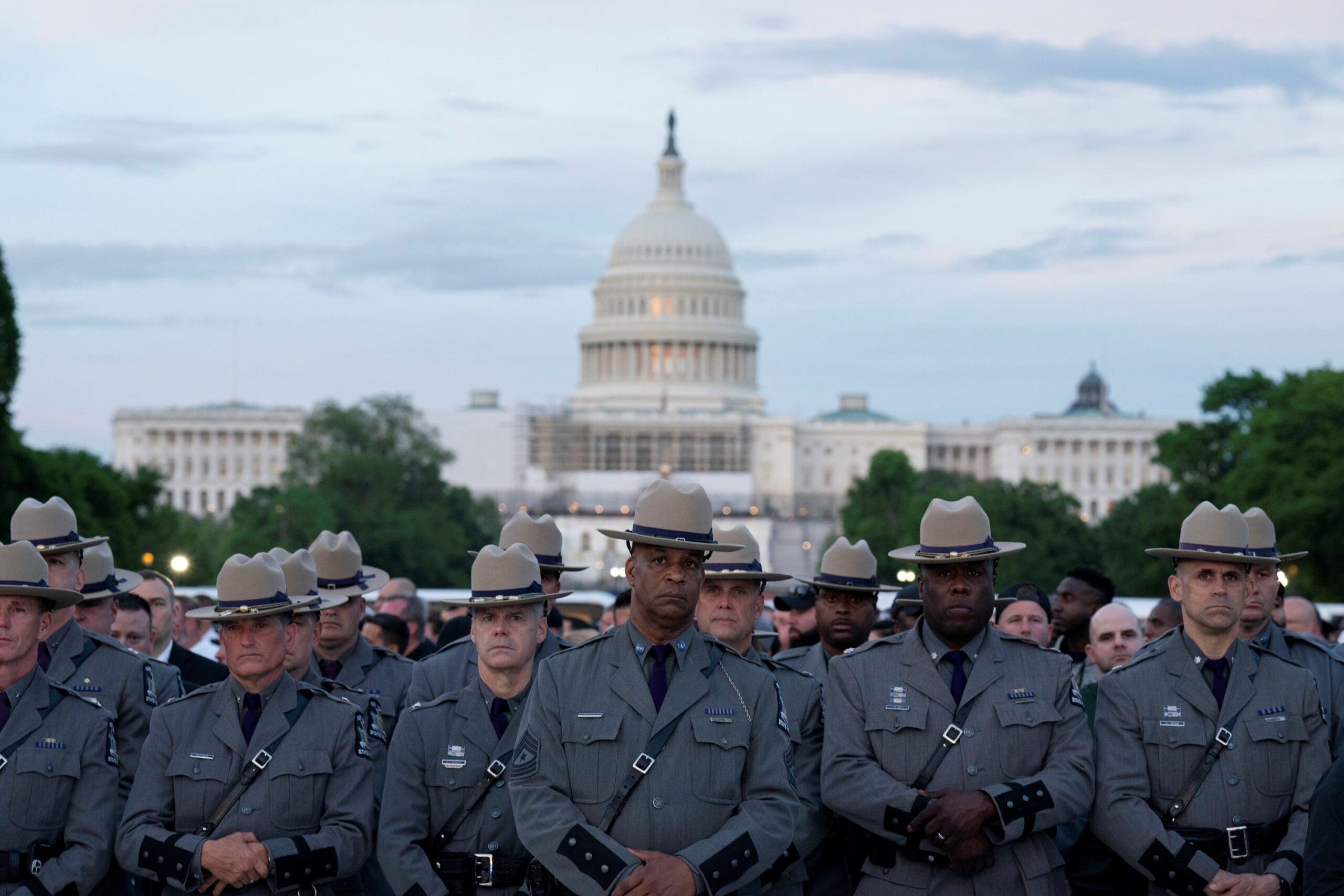
By Gina Christian
“We go out of our way to remind police officers that just by putting on their uniforms, staying at their posts or showing up in their cars, they are deterring crime,” said Father Joseph Franco, pastor of Our Lady of Angels Parish in the Bronx and a New York Police Department chaplain since 2017.
Msgr. Robert Romano, pastor of Our Lady of Guadalupe Parish in Brooklyn and an NYPD chaplain for the past 25 years, will be among the 25,000 to 40,000 on hand in Washington for National Police Week events, which include several memorial services honoring fallen officers. The week is generally observed May 14-20 this year. In Washington it is longer than a week and includes a candlelight vigil on the National Mall May 13 in honor of the fallen.
“We remember them all,” said Msgr. Romano.
But both priests said that the pain of those losses has been compounded in recent years by civil unrest, calls to defund police departments, the COVID-19 pandemic and the long-term effects of the 9/11 terror attacks.
“A lot of national issues have come to the forefront (in recent years),” said Father Franco. “The cops are very demoralized.”
In 2022, an estimated 160 U.S. law enforcement officers committed suicide, according to the nonprofit advocacy and awareness organization Blue H.E.L.P. Like all first responders, police are at increased risk for substance abuse and post-traumatic stress disorder.
In New York, officers who responded to the 9/11 terror attacks continue to grapple with a host of related long-term illnesses, particularly various cancers, said Msgr. Romano, who ministered for weeks at Ground Zero, blessing bodies of fallen officers and celebrating numerous Masses at the site.
Overall, the ranks of police officers in the U.S. have declined in recent years. Although hirings have rebounded, “agencies are losing officers faster than they can hire new ones” due to retirement rates, with “total sworn staffing (dropping) nearly 5% over the past three years,” according to an April 1 press release from the Police Executive Research Forum.
“There used to be cops who would never think of retiring before 20 years because of their pensions and benefits,” Father Franco said. “Now, many are leaving after 17 or 18 years.”
Msgr. Romano said a number of officers are handing in their badges in frustration over a host of reforms that — while intended to reduce abuses of force — “really bind the cops” as they try to carry out even the basic tasks of their profession, leaving them “afraid to take any action” in emergency situations.
“The police I work with say, ‘I’m not looking to discharge their weapons or do anything terrible. I just want to do good police work,'” said Father Franco. “The challenge now is, how do you do your job in light of the new rules, such as ‘no stop-no frisk’? How do you go forward and still keep people safe, and at the same time, keep your sanity and be a person of faith?”
He and Msgr. Romano told OSV News they strive to ensure police officers remain connected to Christ in the face of numerous hazards to both body and soul.
Each priest serves as chaplain of a NYPD-affiliated Catholic fraternal organization — Father Franco for the NYPD Holy Name Society, which covers Manhattan, the Bronx and Staten Island, and Msgr. Romano for the Brooklyn-Queens Holy Name Society. Other Catholic NYPD fraternities include the Regina Coeli Society and the NYPD Anchor Club (an order of the Knights of Columbus). All of the groups foster spiritual wellness through Masses, opportunities for confession, fellowship and charitable outreach.
“Another thing we remind the officers of is Jesus’ instruction that there is no greater love than to lay down one’s life for one’s friends,” said Father Franco. “They’re willing to lay down their lives not just for their friends, but for members of the community.”
Police chaplains provide a ministry of presence, one that actively seeks out officers to engage and support them, said Msgr. Romano, who was tapped by then-NYPD Commissioner Howard Safir for his role because of his ability to easily converse with police.
“When I became chaplain, the commissioner asked me to work on being (even more) user-friendly” by making himself widely available, Msgr. Romano said. “In the past, chaplains were only seen at promotional events, funerals, graduations or hospital visits for injured cops.”
Such pastoral care, along with greater collaboration among chaplains and mental health professionals, can help prevent crises and suicides among law enforcement officers, said Father Franco.
“It’s a team effort,” he said. “We go throughout the precincts, and we also encourage them to lean in on and listen to each other.”
Even amid the worst tragedies that police encounter, Christ makes his presence known, said Msgr. Romano, adding his 9/11 liturgies sowed seeds of faith that over the years have come to bear fruit.
“A lot of the (officers) started coming back to church,” he said. “I don’t have statistics, but I do know that when I talk to them, I hear them say, ‘I was at Mass Sunday, and the priest said …’ Maybe we started something (in them), and that’s where Christ was — he was right there among us.”
Nourished by the Eucharist and sacramental grace, officers in turn can bring Christ’s light to their communities, said Father Franco.
“They’re literally following Jesus in his call to sacrifice everything for those whom we love, and remain faithful unto death,” he said.
